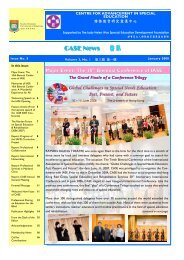Do Secondary L2 Writers Benefit from Peer Comments?
Do Secondary L2 Writers Benefit from Peer Comments?
Do Secondary L2 Writers Benefit from Peer Comments?
You also want an ePaper? Increase the reach of your titles
YUMPU automatically turns print PDFs into web optimized ePapers that Google loves.
164 TSUI AND NG<br />
very rich feedback could be obtained as a result of the collaboration among<br />
peers to improve each other's writing. The feedback, according to Wendy,<br />
could be even richer than that provided by the teacher, especially when<br />
students were experienced in responding to peer writing. She said, ``With<br />
three peers giving comments in a four-member group, the comments can be<br />
very rich, much richer than those of the teacher's who has to rush through all<br />
the compositions in a short time.'' In her opinion, if peer responses are<br />
effective, ``they can do 70 percent of the job'' and the teacher comments<br />
``can do the remaining 30 percent.''<br />
Both Wendy and Janet also pointed out that giving comments to their peers<br />
helped to raise their awareness of the weaknesses in their own writings and to<br />
think of ways to improve them. Janet said, ``For example, I say that certain points<br />
should be organized clearly and better developed, then when I write compositions,<br />
I would remember it. ... I would think about how I could organize it and<br />
what style I should use.'' Giving comments to their peers also helped them to<br />
respect others' rights over their texts. Wendy emphasized the importance of<br />
preserving the writer's original meaning. She said, ``I have a principle when<br />
giving comments: I try to keep the writer's original idea. ... If I make a lot of<br />
changes, even to the meaning, the writer may not know what to do. He may think,<br />
`What can I do now that you have changed so much of my composition? How<br />
can I link this up with the rest of my composition? and what you have written is<br />
not my original idea.' So I'll try to keep the meaning.''<br />
In other words, Wendy and Janet saw the teacher as the authority and would<br />
incorporate the teacher's comments no matter whether they agreed with the<br />
comments or not. They saw the value of peer comments not so much in terms of<br />
helping them to actually make revisions but rather in terms of spotting and raising<br />
their awareness of the weaknesses in their own writing. They also benefited <strong>from</strong><br />
collaborative learning in the peer response sessions.<br />
Category 3: Incorporating Comparatively Lower Percentages of Teacher<br />
and <strong>Peer</strong> <strong>Comments</strong><br />
Both Stanley and Nigel incorporated relatively lower percentages of teacher<br />
and peer comments. In the case of Stanley, the percentage of peer comments<br />
incorporated was very low, only 26 percent. It was clear <strong>from</strong> the interview that<br />
they did not trust their peers' ability to make judgements on their writings. When<br />
Nigel was asked what difficulties he had in incorporating peer comments in his<br />
revision, he said, ``I don't have much confidence in my peers. We are peers. I can't<br />
trust entirely that their judgements are correct.'' Similarly, Stanley admitted that he<br />
largely ignored peer comments. He said, ``I turn a deaf ear to their (peers')<br />
comments. ...They have no authority, so their comments aren't of much quality.''<br />
By contrast, they felt that teacher comments were of better quality despite the<br />
fact that they did not incorporate a high percentage of teacher comments.

















